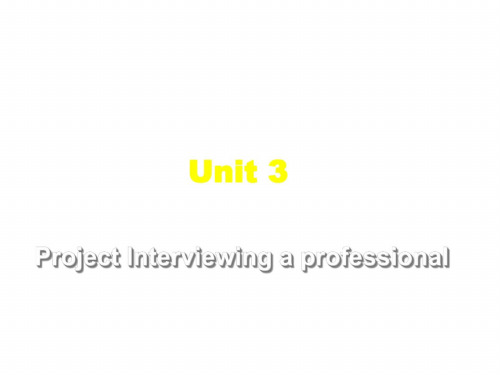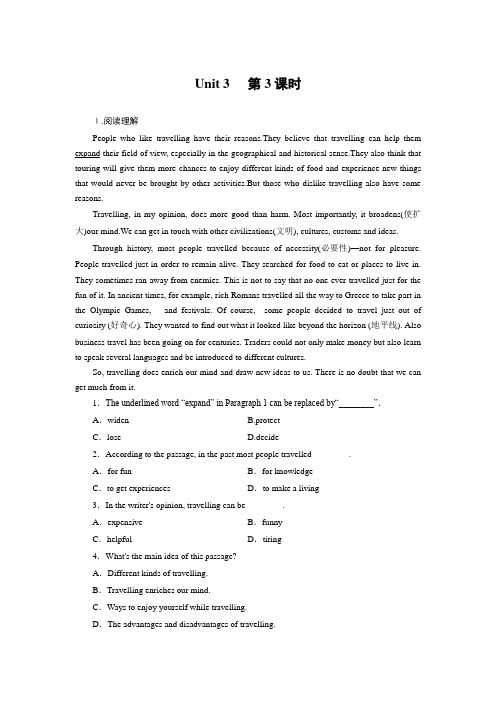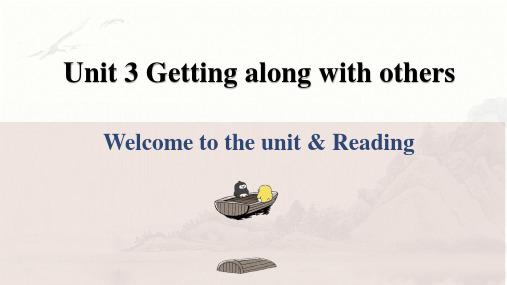高一英语上册Unit 3 第三课时
- 格式:ppt
- 大小:449.50 KB
- 文档页数:15




Unit 3第3课时Ⅰ.阅读理解People who like travelling have their reasons.They believe that travelling can help them expand their field of view, especially in the geographical and historical sense.They also think that touring will give them more chances to enjoy different kinds of food and experience new things that would never be brought by other activities.But those who dislike travelling also have some reasons.Travelling, in my opinion, does more good than harm. Most importantly, it broadens(使扩大)our mind.We can get in touch with other civilizations(文明), cultures, customs and ideas.Through history, most people travelled because of necessity(必要性)—not for pleasure. People travelled just in order to remain alive. They searched for food to eat or places to live in. They sometimes ran away from enemies. This is not to say that no one ever travelled just for the fun of it. In ancient times, for example, rich Romans travelled all the way to Greece to take part in the Olympic Games, and festivals. Of course, some people decided to travel just out of curiosity (好奇心). They wanted to find out what it looked like beyond the horizon (地平线). Also business travel has been going on for centuries. Traders could not only make money but also learn to speak several languages and be introduced to different cultures.So, travelling does enrich our mind and draw new ideas to us. There is no doubt that we can get much from it.1.The underlined word “expand” in Paragraph 1 can be replaced by“________”.A.widen B.protectC.lose D.decide2.According to the passage, in the past most people travelled ________.A.for fun B.for knowledgeC.to get experiences D.to make a living3.In the writer's opinion, travelling can be ________.A.expensive B.funnyC.helpful D.tiring4.What's the main idea of this passage?A.Different kinds of travelling.B.Travelling enriches our mind.C.Ways to enjoy yourself while travelling.D.The advantages and disadvantages of travelling.Ⅱ.七选五What is the secret of writing a good letter? Here are two main ones. Don't try to be fancy. Don't try to impress your reader. You will be successful if you follow these seven Cs.Clear. Use short, direct sentences. ___1___ Talk as if the reader were right there with you. Above all, don't use an introduction.Correct. ___2___ Don't guess, even for spelling. Refer to your dictionary. If you need to, check a reference(参考) book, too.Complete. Don't scatter (分散,散开) our points.___3___ This is good organization, too.Courteous(有礼貌的). Be friendly rather than overly(过于) casual. Present your information nicely even if you are complaining about something. In all letters, treat others as you want them to treat you.Concise(简洁的). Make each point as clearly and briefly as you can.Conversational. This is really the secret of good writing. ____4___ Such a letter has a natural, friendly tone(语气). Let your personality come through naturally.Considerate(体贴的). ___5___ Write about what you believe the reader needs or wants to know. Try to be helpful. This will build good feeling towards you.The seven Cs are about writing letters. But how about school papers? Use the seven Cs. Write as if you are talking to your teacher or professor. You'll be surprised. You'll almost instantly become a good writer. And you might even enjoy writing from now on.A. Just “talk” to the person.B. Think of the readers' point of view as you write.C. Make them easy to understand.D. Include long sentences in your letter.E. Make sure what you say is correct.F. Writing should not be taken too seriously.G. Finish one point completely before going on to the next.Ⅲ.书面表达某英语刊物正在进行有关旅游的征文活动,请根据以下提示,以Travelling为题目,用英语写一篇短文,以便向该刊投稿。


Ⅰ品句填词1.It is also wise of children to____________(请教) their parents when making decisions.答案:consult2.A healthy diet is very important for people. It contains some fat, some ____________(纤维),a little salt and so on.答案:fibre3.Drink something hot after you eat, and your stomach will ____________(消化) your food better.答案:digest4. It is said that yoga is of great____________(好处) to human health.答案:benefit5.Many people like the film because it ____________(结合) education with recreation.答案:combines6.In my opinion, you had better set a ____________(限制)to the expense of your trip.答案:limit7.We’ll run into ____________(债务) if you spend more than our income.答案:debt8.Mum put down the phone, ____________(叹气) and shook her head sadly.答案:sighedⅡ单句改错1.There is a limit to people’s life, but no limit to learn the knowledge.____________________答案:learn→learning2.He should have handed in his paper yesterday, and he forgot about it completely.____________________答案:and→but3.Strangers find the two girls are so alike as it is difficult to tell one from the other.____________________答案:as→that4.He is such clever a student that he is able to work out all the difficult problems.____________________答案:such→so5.Neither he nor his friends has ever been to Guilin.____________________答案:has→haveⅢ完成句子1.彼得工作如此努力,以至于他不久就在学习上取得了很大的进步。
Unit 3 The Million Pound Bank-NoteLongyou middle school Wang weihongI. Teaching Material Analysis1. Teaching items:This is the first reading in Unit 3 of Model 3. It’s also amain part in this unit. Mark Twain is the greatest humorist of the 19th century American literature as well as a great playwright. Many of his plays are known to people all over the world. And The Million Pound Bank-Note is one of the best.The play is one of the most useful and interesting means by which to improve students oral English skills. Beginning with this book and throughout the rest of the NSEC series, students will be provided with plays adapted from famous native-speaking writers in English. Plays will enable your students to read and hear natural language in a dramatic context. Just as importantly, reading and acting these plays aloud will increase students’ self-confidence in using English, which in turn will increase their overall motivation to learn English. This play isa very chance and a good beginning.2. Aims to the teachingKnowledge goalsa. Help the Ss understand the main idea of the play.b. Let the Ss master some important phrases and sentence patternswords and phrases:bet, make a bet, permit, go ahead, by accident, stare, account for, to be honest, jealous).Patterns:Would you please come in?Would you mind waiting just a few minutes?May I ask you how much money you have?--Well, to be honest, I have none.Could you offer me some kind of work?I wonder, Mr. Adams, if you mind us asking a few questions?--Go right ahead.Ability goalsa. Enable students to read and hear natural language in a dramatic context and increase their self-confidence in using English, which will increase their overall motivation to learn English.b. Enable students to sum up the main idea of ACT ONE Scene 3.c. Enable students to understand the details about the whole scene.d. Act out the scene.e. Express their opinions by answering the following questions:(1) What do you think will happen to Henry with the bank-note?(2) Will the bank-note help him or get him into trouble?(3) Do you think money is everything?(4) Do you agree that only money can bring people happiness?Emotion goalsBy reading the play,the students analysis and unearth the characteristics of the heroes in the play to learn the hypocritical aspect of the capitalism at that time and set up a right philosophy.3. Teaching important and difficult pointsTeaching important points1. How to interpret language through tone of voice and body language, gaining a greater appreciation of the various verbal and non-verbal ways in which language works.2. Discuss the questions:(1) What do you think will happen to Henry with the bank-note?(2) Will the bank-note help him or get him into trouble?(3) Do you think money is everything?(4) Do you agree that only money can bring people happiness?Teaching difficult pointsDiscuss the questions:(1) What do you think will happen to Henry with the bank-note?(2) Will the bank-note help him or get him into trouble?(3) Do you think money is everything?(4) Do you agree that only money can bring people happiness?II. Analysis of the Teaching Methods and aidAs we all know, the main instructional aims of learning English in middle school is to cultivate Ss’ basic abilities of listening, speaking, reading, writing and their good sense of English. In order to finish the teaching goals above, I’ll mainly use “Task-based Language Teaching Method”. To make the class a student-centered one, the students are encouraged to work in groups, so they have more opportunities to practice. I’ll let the Ss learn in real situations and finish the tasks by teamwork and individual activity. Teacher acts as an organizer, a listener and a helper. I will assign the tasks according to the students’ level and let Ss learn step by step. I’ll help the Ss to get a better understanding of the text and enlarge the Ss’range of knowledge, train their studying interests, and improve their abilities of using English.Aid is multi-media computer and a set of suit. Using the computer can open the Ss’ wide fields of vision and enlarge the capacity of lesson.III. Analysis of the Learning Method(1) To train them to study independently, Ss can collect some information, famous plays and playwrights on the Internet by previewing before class;(2) Guide Ss to master and use reading skills, skimming, scanning andcareful reading, and master student-centered vocabulary learning method by the context, text clues and their word knowledge;(3) Guide Ss to study English cooperatively It contains pair and group work. They can make a discussion and learn from each other. It can arouse students to think and to say what they want to. Study becomes more relaxed and pleased in this kind of environment.IV. The Time Table of Teaching Steps(1) warming up (3 minutes)(2) Pre-reading (5 minutes)(3) Reading (23 minutes)(4) Post reading (12 minutes)(5) Summary and homework (2 minutes)V. Teaching StepsStep 1. warming upPurpose: To train the students’ self-reading ability and warm up.(1)Self-study: Reading material on P23 About Mark Twain(2)Teacher-students activity:What’s the real name of Mark Twain?When was he born and when did he die?Do you know all the places where he lived?Can you name three of his famous stories?Step 2. Pre-readingPurpose: To form a better surrounding for students by speaking and discussions. It will provide situation and backgroundto read the play at the same time.(1) Teacher-students activity:1.T: If a rich person gives you a large amount of money to use as you like, for example, one million pound, what will you do? Why? (The teacher draws a picture on the blackboard.)(Students have a discussion on this question. Whatever choice students make here, they should be ready to offer their classmates a good reason for it.)(2) Group work. Do you want to know what happened to Henry Adams in THE MILLION POUND BANK-NOTE written by Mark Twain? Have you ever readthe story? Have you seen the movie? (The teacher plays the short video of the reading part)Step 3. While-reading.Purpose: To grasp the main ideas and some details of the text, while reading. I’ll guide Ss to use the reading skills andform the habit of reading.1. Scanning Get the students to comprehend the whole scene quickly and accurately and meanwhile help the students to form a good habit of reading. Teachers give the students a couple of minutes to look through the whole scene. Tell the students to read the text silently and then ask some detail questions about the text on the slide show with their partners. Teachers encourage the students to express their ideas.Teachers show the questions on the screen:1. How did Henry Adams come to England?2. Where did Henry work? How much money did he have?3. What did the two gentlemen give Henry?4. When can Henry open the letter?(Students read the whole scene (ACT ONE Scene 3) for three minutes and try to answer the questions.)2. Second reading: Reading aloudIn this part, students will read the text again and try to understand the sentences and the main ideas of the whole scene.3.ListeningIn this part, students will listen to the tape and try to find the characteristics of the whole scene. After that, teachers discuss the question with the students and then check the answer. And then the teacher as well as the students read the passage together, which will be served as the ground for the acting afterwards. T: Please listen to the tape and try to find the characteristics of the text. (Students listen to the tape.)Step 4 Post-reading1. Students read the whole scene again and again and try to act it out. First in small groups and then several are chosen to act it out before the whole class.2. Discuss the questions:(1) What do you think will happen to Henry with the bank-note next?(2) Will the bank-note help him or get him into trouble?Step 5 Summary and homeworkPurpose: To draw a conclusion of the text, train Ss to practice English after class and do some extensive exercises toconsolidate the knowledge they’ve learnt.T: Ok, class, what do you think of this play? Is money so important?T: Some people say that money is everything. What do you think of this opinion?T: But some people still think that only money can bring them happiness. What do think of this?T: So, class, we should have a correct attitude towards money. Now, let’s look at today’s homework.1. Try to write the next scene making full use of your imagination according to the question: What will happen to Henry with the bank-note?2. Review the words and sentences patterns of the text.。